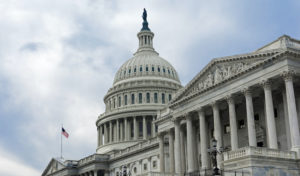
Government Accountability Office report on military aid reflects historical tug-of-war between Congress and the President.
Even though the Senate has now acquitted President Donald J. Trump in his impeachment trial, a “bombshell” report from the Government Accountability Office (GAO) still remains, concluding that the Trump Administration violated the law when it held up Ukrainian military aid.
Media outlets pointed to the “non-partisan” and “independent” nature of GAO to bolster the credibility of GAO’s conclusion. And the report became part of the Democratic House managers’ case against the President.
Yet how exactly did this seemingly arcane agency end up in the middle of this heated political debate?
GAO’s unexpected starring role in the impeachment of President Donald J. Trump is a direct result of the agency’s statutory responsibility to police the President’s actions under the Impoundment Control Act. Viewed as part of a historical trend, however, GAO’s role in this impeachment process is not surprising. Since creating GAO, Congress has placed increasingly more responsibility on the agency to serve as a watchdog and a check on executive power.
Congress created the General Accounting Office in 1921—renamed the Government Accountability Office in 2004—with the principal aim of reining in the waste of public funds following World War I. Congress directed the agency to find “efficiency in public expenditures.” Early expansions of power in 1945 and 1950 focused narrowly on the agency’s audit functions and establishment of uniform “accounting standards” across the federal government.
But ninety-nine years later, GAO’s responsibilities are much more expansive. According to Nancy Kingsbury, the managing director of applied research and methods at GAO, the agency issues 1,200 reports annually. These reports range from policy analyses to legal opinions, and Congress has progressively added to GAO’s responsibilities statute by statute.
One such statute delegating oversight responsibilities to GAO is the Impoundment Control Act of 1974. Under this law, GAO monitors and polices the presidential impoundment process. When the executive branch wants to withhold—or impound—money that Congress designated for spending, it must submit a request and justification to Congress and GAO. The Act requires GAO to report to Congress about all proposed impoundments and their anticipated impacts.
In the case of the Ukrainian military aid, GAO noted that the Office of Management and Budget (OMB) “did not transmit a special message proposing to defer or rescind the funds.” Furthermore, OMB could not show any “external factor causing an unavoidable delay” in the transfer of appropriated funds to Ukraine. This made the Administration’s withholding of aid illegal under the Impoundment Control Act.
Procedurally, the law requires GAO to report to Congress on unreported impoundments and provide its legal opinion whether the action violates the law or falls under an exception, such as programmatic delay.
GAO’s recent report on the illegality of the Trump Administration’s impoundment appears to be compelled by the Impoundment Control Act. Assuming it was not—perhaps because the impoundment was rendered moot by the Trump Administration’s release of funds in September—GAO is still authorized by the Legislative Reorganization Act of 1970 to conduct evaluations of any government “program or activity” at the request of Congress.
GAO’s report, for example, notes that the initial request to investigate the legality of this action came from Senator Chris Van Hollen (D-Md.) at both a hearing and in writing. This broad authority to investigate at the command of Congress makes GAO a tool for Congress to check executive power when it involves how public funds are used.
GAO’s enabling legislation makes the Comptroller General head of GAO.
The independence of GAO comes from the Comptroller General’s insulation from executive control. The Comptroller is appointed by the President and confirmed by the Senate, serving for a 15-year term. GAO is considered non-partisan because the President can only select from a list of nominees agreed to by the minority and majority leaders of the House and Senate, among others.
The current Comptroller, Gene L. Dodaro, was appointed by President Barack Obama in 2010 and his term is set to run until 2025.
The Comptroller’s removal protections also guard the office from partisan influence. The Comptroller can only be removed by Congress, not the President. By statute, removal of the Comptroller is limited to a small number of causes: specifically, incapacitation, neglect of duty, malfeasance, or crimes of moral turpitude.
Due to its timing and conclusion, GAO’s Ukraine report likely represents a high-point of public attention for the agency. The report is both a product of GAO’s special responsibilities under the Impoundment Control Act and GAO’s role as a congressional watchdog on the executive branch.



